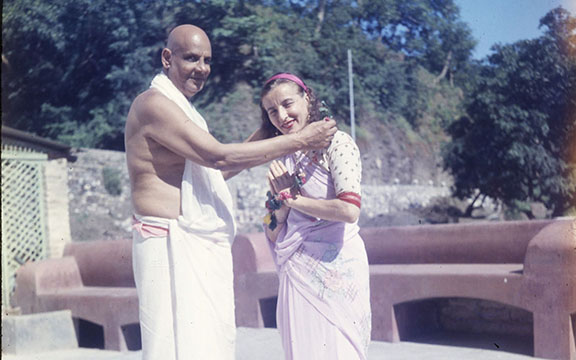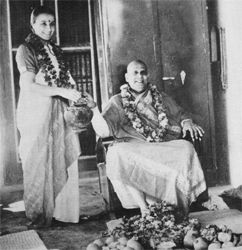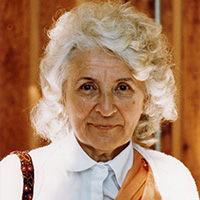
(Photo: Swami Sivananda garlands his new disciple whom he names “Radha.”)
Yoga is a path of liberation, and liberation has to begin in the here and now of our daily lives. We have to liberate ourselves from our own self-made prisons. These are prisons of attachments, concepts and habits, and the compelling forces of mechanical reactions and untested beliefs.
Where are you imprisoned? You may feel there are areas, such as your work situation, where you didn’t create the prison—the eight-hour workday five days a week, the tough boss, the lack of recognition, the low salary, or whatever the situation is. But do you have to stay in that prison? No. Sometimes it is your own lack of courage that keeps you prisoner.
Many people feel comfortable in the security they’ve created and yet are angry at themselves for needing such security because it prevents them from trying something new. They also may have spent whatever they’ve earned, leaving no money to pay for additional training or education. Or they may have become lazy in their thinking and blame life or destiny for circumstances that they themselves have created.
Always remember you are the doer, and you can undo. You have the power of choice, which is often not recognized. Take responsibility for the choices you have made in your life—for your job, your education, your marriage partner, your desire for spiritual life. The power of choice is yours. You even have the power to make changes if you discover that your original choices did not meet your expectations.
How can new decisions be made? First, get all of the facts together about what you want to do. Generate options. Pay attention to your emotional responses to the various possibilities because where your joy is the greatest, there you will succeed—even if you think you have little to offer or you have little capital to enter into any new business or professional venture.
We learn by trial and error, and all great things in life have been achieved by trial and error. So we have to try. Your past mistakes are also not important. We have all made our mistakes. I have made my own, therefore I would never be in a position to judge others. But what is it you want to do now? Where do you want to go from here? If you step onto the royal highway towards a spiritual goal—which you have to define and lay out for yourself because it is your path and it is your life—then you have to take responsibility for what you do. And you must try your very best not to repeat past mistakes, even if you occasionally slip. If you do slip, forgive yourself but carry on. It is important to make a clear decision of will. If you can turn your stubbornness into properly directed willpower, you will be successful in reaching your spiritual goal because perseverance is needed.
Spiritual liberation is not possible unless you lay a good, solid foundation in your daily life— building character and taking responsibility for yourself. Daydreaming will not lead to liberation. You can’t just think about it. You have to take action. You have to take your life very firmly into your own hands.
How can we become aware? Where shall we begin? Again, we want to be practical. Look into your habits. Look into those mechanical reactions, things that you do over and over again with little change. Keep a daily diary in which you write your reflections on your daily actions and become aware of how mechanical, almost robot-like you can be. Observe how difficult it is to drop your grudges and negative thinking. Not only do we have to undo the selfishness from this life, but we also have an accumulation of karma from many lives. Life is the battleground of the Gita. Wherever you are, you battle your own selfishness, you battle your own many personality aspects and you battle your illusions.
As you work on yourself ask, Have I changed? What have I accomplished in my attempts towards self-mastery? When you begin to clearly see your self-made prisons and limitations, then you will slowly start to understand what the word “liberation” means. Usually we have a theoretical understanding. We intellectualize very cleverly about all these things but haven’t necessarily accomplished anything.
So we have to be clear. Tell yourself the truth about yourself—that you are just starting out on the path. The liberation that you’re aiming for will come by degrees, and so will meditation. Without the ability to concentrate, there is very little possibility of results. Making the mind a blank is not meditation. Triggering yourself into a state of trance is not meditation. Meditation comes when the mind is calm, and that calmness comes only when you stop scheming to fulfill selfish desires.
There is no sudden miracle where all of your negative characteristics just drop away. It is a Western misconception that if you meditate eight hours a day like the yogis in India all your shortcomings will disappear. They won’t. We have to work on ourselves. God will not do it for us. No true teacher will do it for you. You must take responsibility for yourself. You are the doer of the wrong actions in the past, so you are also the one who can undo them.
It is my prayer that you all have the courage, the determination, and the persistence to undo your self-made prisons. Awareness is the key. Recognize the key. Find the door, put the key in the lock, and open the door. Courageously step into that new freedom.
 In his farewell address to me when I left India, Swami Sivananda said, “Don’t worry about the absolute and the ultimate. Selfless service alone will make you divine.”
In his farewell address to me when I left India, Swami Sivananda said, “Don’t worry about the absolute and the ultimate. Selfless service alone will make you divine.”
Selfless service means doing work without self-gratification, not just because you like it. You work without waiting for approval, without praise. You do the work that needs to be done simply because it needs to be done, putting high quality into your efforts and expecting nothing in return. Even my words imply it is difficult, but if you can do it you will grow very strong inwardly. Selfless service brings very good results.
You should not object even if you are taken for granted because if you sit down and look at your entire life, you’ll see how much you have taken for granted. If you had to pay a dollar for every time you took something for granted, you would owe a lot of dollars. In other words, there’s a lot to be repaid. Selfless service helps us repay our debts.
Besides making a living, everybody should do some kind of selfless service. There’s no limit to the opportunities. Even if you are in an office from 9 to 5, when you hear the siren of a fire truck or an ambulance, you can think Om Namah Sivaya or repeat the Lord’s Prayer—it doesn’t really matter which—for anybody who is in danger and for whatever help they may need. It takes only a minute and then you can continue your work. The problem is that we are so wrapped up in ourselves that when we hear a siren we think, What a disturbing noise! But we have the power of choice. We can choose to send a blessing. Cultivating concern is a very important thing. It helps to counteract all the criticism that we usually generate.
About the Author:
 Swami Sivananda Radha was one of the first Western disciples of Sri Swami Sivananda, he initiated her into monkhood as, Swami Sivananda Radha in 1956. She was a pioneer in bringing Yoga to the West, establishing the Yasodhara Ashram in Canada and later, branches around the world. Swami Sivananda Radha is the author of 10 classic books on Yoga, including Kundalini Yoga for the West and Hatha Yoga: The Hidden Language. Her teachings focus on developing awareness and quality in life. For more information: www.yasodhara.org.
Swami Sivananda Radha was one of the first Western disciples of Sri Swami Sivananda, he initiated her into monkhood as, Swami Sivananda Radha in 1956. She was a pioneer in bringing Yoga to the West, establishing the Yasodhara Ashram in Canada and later, branches around the world. Swami Sivananda Radha is the author of 10 classic books on Yoga, including Kundalini Yoga for the West and Hatha Yoga: The Hidden Language. Her teachings focus on developing awareness and quality in life. For more information: www.yasodhara.org.
(Adapted from a talk given in 1974)

